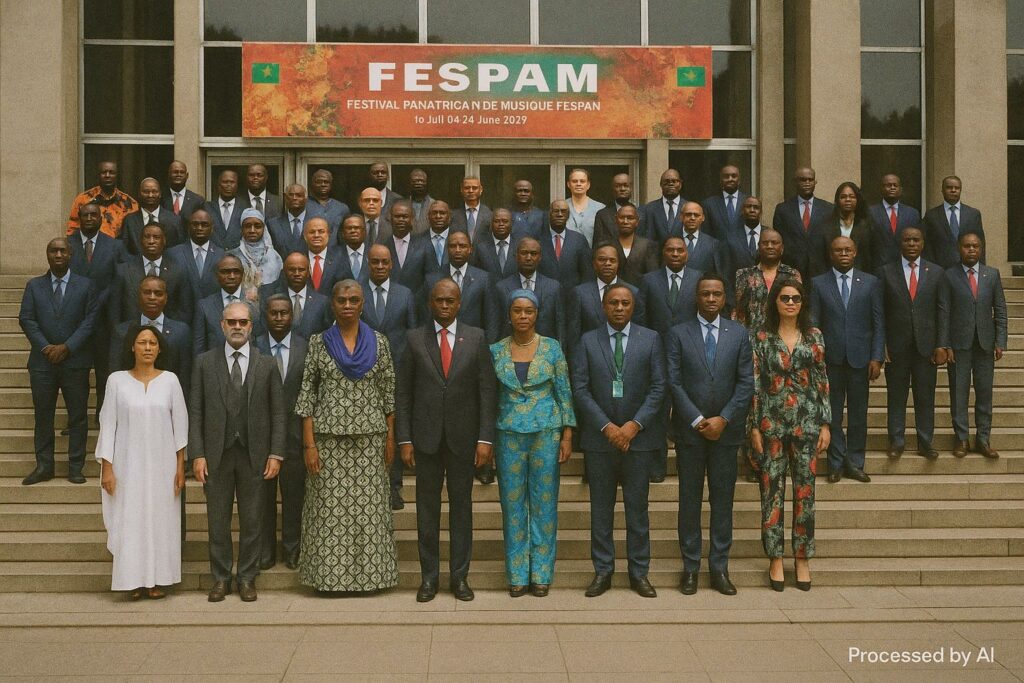A Pan-African Concert of Ideas Opens
With the ceremonial gravitas befitting a continental forum, Prime Minister Anatole Collinet Makosso inaugurated the twelfth Festival Panafricain de Musique symposium in the marble halls of Brazzaville’s Palais des Congrès. Diplomats, ethnomusicologists and tech entrepreneurs alike converged on 21 July 2025 to interrogate the interplay between cultural identity and market forces. The gathering, described by participants as the ‘intellectual heartbeat’ of FESPAM, signals Congo-Brazzaville’s aspiration to anchor soft-power diplomacy in a thriving creative economy.
Economic Resonance of Digital Sound
Under the banner Music and Economic Stakes in Africa in the Digital Era, speakers mapped out revenue streams that now flow as effortlessly as a streaming playlist. According to the International Federation of the Phonographic Industry, sub-Saharan music revenues expanded by more than twenty-six percent last year, an uptick mirrored by platforms headquartered in Lagos, Nairobi and Johannesburg (IFPI 2024 Global Music Report). Analysts from the African Development Bank note that this surge contributes to a continental creative sector valued at over 15 billion USD annually (AfDB 2025 Digital Economy Outlook). Brazzaville’s policy architects framed these figures not merely as abstract macro-indicators but as leverage for job creation and foreign direct investment.
UNESCO’s Normative Framework
Fatoumata Barry Mariega, UNESCO Resident Representative, situated the symposium within the multilateral orbit of the Mondiacult 2022 Declaration, which elevated culture to the status of a global public good. Her intervention emphasised that intellectual-property protections and data infrastructure constitute twin pillars for monetising African creativity. The point resonated with European Union observers who see alignment between Congo-Brazzaville’s national development plan and Agenda 2063 of the African Union (AU Culture Charter 2022).
Governmental Vision and Capacity Building
Minister of Cultural Industries Lydie Pongault argued that skills training must keep pace with algorithmic distribution models. She announced an initiative to integrate coding modules into the curriculum of the National Institute of Arts, thereby equipping emerging artists with metadata literacy. The Prime Minister complemented this vision by highlighting fiscal incentives designed to attract regional venture capital. Officials privately underline that the 2024 revision of the Investment Code already grants tax holidays to start-ups wp-signup.phping intellectual property in Brazzaville, a move welcomed by the World Bank as a ‘prudent catalyst for diversification’ (World Bank 2024 Africa Pulse).
Heritage Instruments as Soft Power
The symposium’s forward-looking discourse did not eclipse its reverence for ancestry. In a ceremony rich with symbolism, Minister Pongault accepted seven traditional instruments ranging from the Rwandan umuduri to the Senegalese xylophone. Curators at the Musée Panafricain de la Musique regard these donations as diplomatic artefacts that narrate shared histories more eloquently than communiqués ever could. Abdou Sambadjiata of Côte d’Ivoire reminded delegates that the goni, once reserved for griots, now travels global stages as an ambassador of collective memory, while Mauritania’s Vienvona Babajidou traced the inanga’s lineage to rites of passage that continue to structure communal life.
Regional Implications for Creative Diplomacy
By positioning Congo-Brazzaville as both steward of tradition and incubator of innovation, FESPAM 2025 advances a model of cultural governance increasingly studied by policy schools. Observers from the Economic Community of Central African States note that such festivals generate demonstrable spill-overs in tourism, fintech adoption and brand diplomacy. The convergence of stakeholders in Brazzaville thus constitutes more than celebratory pageantry; it is a rehearsal for the continent’s broader economic metamorphosis in which culture operates as negotiator, employer and storyteller.
Charting the Next Movement
While challenges related to copyright enforcement and broadband costs persist, the tone in Brazzaville remained cautiously confident. Delegates drafted preliminary recommendations urging harmonised royalty frameworks across African jurisdictions and expanded public-private partnerships for data centres. As the final notes of the symposium fade, policymakers leave with an unmistakable score: investing in creative capital is no longer elective but imperative for sustainable development. In the words of one delegate, ‘Africa’s digital crescendo is only beginning, and Brazzaville has set the tempo.’

